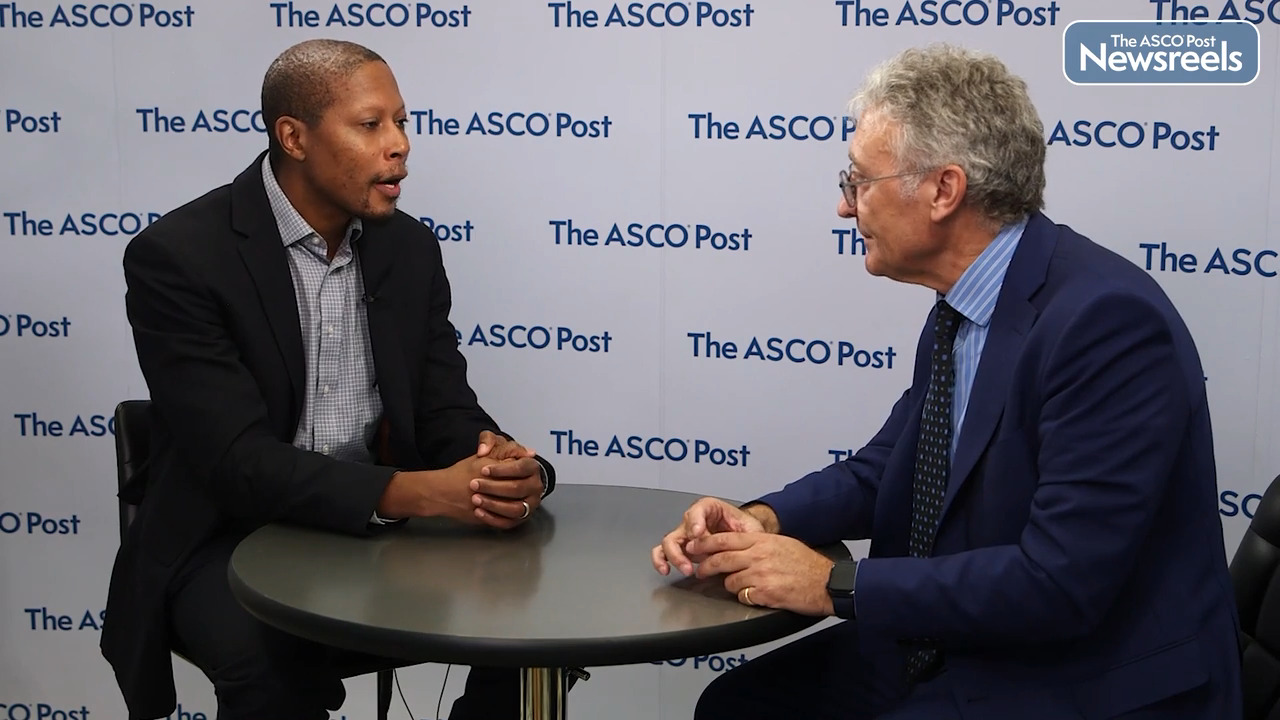Thierry Conroy, MD, on Rectal Cancer: Long-Term Results on mFOLFIRINOX vs Preoperative Chemoradiation Therapy
2023 ASCO Annual Meeting
Thierry Conroy, MD, of the Institut de Cancérologie de Lorraine, discusses phase III findings from the PRODIGE 23 trial, showing that neoadjuvant chemotherapy with mFOLFIRINOX followed by chemoradiotherapy, surgery, and adjuvant chemotherapy improved all outcomes, including overall survival, in patients with locally advanced rectal cancer compared with standard chemoradiotherapy, surgery, and adjuvant chemotherapy (Abstract LBA3504).
Transcript
Disclaimer: This video transcript has not been proofread or edited and may contain errors.
Prodige 23 is a phase three randomized trial that we perform in France in 35 centers. And we have presented the seven-year result of that study. And we confirm all the benefit we had in this study, and we already published. It was a comparison between the standard of care preoperative chemoradiation ventium surgery and six month of adjuvant chemotherapy in patients with locally advanced rectal cancer. And we compare it to three month of induction chemotherapy using the modify Folfirinox regimen than preoperative chemo radiation TME and three month of adjuvant chemotherapy. All patients receive six month of chemotherapy.
We have now a follow-up of 82 month. It means quite seven year, and we confirm a very important reduction of metastases as from 10%. We have still a benefit in the primary endpoint, which is DFS. Also benefiting cancer specific survival. One important point is that we had no increase in local relapse in the experimental arm, which is lower than 5%. And the other point is that the survival at metastatic disease was exactly the same in the two arms, and it was not reduced in the experimental arm.
We had an overall survival benefit, and this is the major point of this study, as we had the 7% overall survival benefit when quality of life improve faster and higher levels in the experimental alarm. To conclude, this is the very positive trial and very good news for patients. The next step will be to know if with induction chemotherapy with Folfirinox some patients may not receive chemo chemo radiation, especially in case of good response to induction chemotherapy. The other point is to know if induction chemotherapy will increase the rate of organ preservation.
Related Videos
The ASCO Post Staff
Jennifer L. Crombie, MD, of Dana-Farber Cancer Institute, discusses the historically poor outcomes for patients with relapsed or refractory diffuse large B-cell lymphoma (DLBCL). Her study examined real-world data on the use of novel therapies in this population and found that outcomes with second- and third-line regimens of polatuzumab vedotin-piiq plus bendamustine and rituximab and tafasitamab plus lenalidomide remain suboptimal, with worse outcomes particularly after chimeric antigen receptor T-cell therapy (Abstract 7552).
The ASCO Post Staff
Muhit Özcan, MD, of Turkey’s Ankara University School of Medicine, discusses waveLINE-007, a two-part study now recruiting in more than 20 locations, to determine the safety and recommended phase II dose of the antibody-drug conjugate zilovertamab vedotin in combination with R-CHP (rituximab, cyclophosphamide, doxorubicin, prednisone) in previously untreated patients with diffuse large B-cell lymphoma (DLBCL). Efficacy of this regimen will be investigated in the second half of the study (Abstract TPS7589).
The ASCO Post Staff
Eunice S. Wang, MD, of Roswell Park Comprehensive Cancer Center, and Gregory Roloff, MD, of the University of Chicago, discuss data that are the first to demonstrate post–FDA approval efficacy and toxicity rates of brexucabtagene autoleucel in adults with relapsed or refractory B-cell acute lymphoblastic leukemia. Although the data may confirm high response rates associated with this agent, they also highlight the need for interventions to reduce associated toxicities (Abstract 7001).
The ASCO Post Staff
Tycel J. Phillips, MD, of City of Hope National Medical Center, and Emanuele Zucca, MD, of the Oncology Institute of Southern Switzerland and the International Extranodal Lymphoma Study Group, discuss findings from the largest prospective study of patients with primary mediastinal B-cell lymphoma. The trial data support omitting radiotherapy in patients who achieve complete metabolic response after immunochemotherapy (Abstract LBA7505).
The ASCO Post Staff
Omid Hamid, MD, of The Angeles Clinic & Research Institute, discusses study findings on fianlimab plus cemiplimab-rwlc, which showed clinical activity in patients with advanced melanoma, comparing favorably with other approved combinations of immune checkpoint inhibitors in the same clinical setting. This is the first indication that dual LAG-3 blockade may produce a high level of activity with significant overall response rate after adjuvant anti–PD-1 treatment. A phase III trial of this regimen in treatment-naive patients with advanced melanoma is ongoing (Abstract 9501).





